Edith Maxwell's Blog, page 41
July 14, 2023
Building Character with Guest Leslie Budewitz #giveaway
By Edith, vacationing in coastal Maine.
But I’m never too busy – or relaxed – to welcome my good friend, Leslie Budewitz, to the blog. First, you all need to know about her latest Spice Shop Mystery, which comes out next week.
Here’s what I said about it: “Between a Wok and a Dead Place is the most tantalizing Spice Shop mystery yet!” — and that quote appears on the front cover!

It’s the Lunar New Year, and fortunes are about to change. Pepper Reece, owner of the Spice Shop in Seattle’s Pike Place Market, loves a good festival, especially one serving up tasty treats. So what could be more fun than a food walk in the city’s Chinatown–International District, celebrating the Year of the Rabbit? But when her friend Roxanne stumbles across a man’s body in the Gold Rush, a long-closed residential hotel, questions leap out. Who was he? What was he doing in the dust-encrusted herbal pharmacy in the hotel’s basement? Why was the pharmacy closed up—and why are the owners so reluctant to talk? As Pepper begins to expose the long-concealed truth, the killer is on her tail, driven by hidden demons and desires. Can she uncover the secrets of the Gold Rush Hotel without being pushed from the wok into the fire?
Take it away, Leslie!
Recently I gave several presentations at a writers’ conference, including one called “Building Character.” The characters are the heart of every story—even in a mystery or thriller, where the plot is critical. When you tell someone about a book you loved, you don’t say “It’s about a bomb . . .” You say “It’s about a woman who . . .” And though I read and write both series and standalones, I know that when readers fall for a series, they remember the characters as much as the individual plots—sometimes more.
Why is that? If the writer’s done her job, we connect with these people of the page. We know where they live and work, their friends and family and pets, but we also get to see their hearts. Their quirks and secrets. Their fears and internal conflicts—and what they’ll do to get what they want and to protect the people they love. We like some more than others, and we’re curious: What happens next? Just like with real-life friends, we want to know what’s going on.
Of course, we get to know story people in installments—just as in real life. You might meet someone in a book group or a watercolor class, and quickly find out what they like to read, how they think about books and art, and a bit about their outlook on life. Then you meet up for a walk or coffee, and find out a little more. You learn more still when you run into them with friends or their partner at a gallery opening or down by the lake.
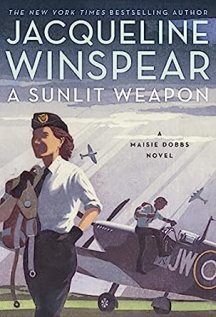
A few series characters who keep me coming back to find out what happens next: Maisie Dobbs, namesake of Jacqueline Winspear’s crime novels set largely in England from the mid 1920s into WW II, was put into service as a child by her widowed father, Frankie, a working man with few other options. The family recognized her potential and had her educated. During the Great War, at only 17, she signed on as a nurse and is still haunted by the ghosts of battle. She became an investigator and psychologist when both were new fields, and while she’s book smart, she also knows people. Thanks to her mentor, she’s learned to trust her instincts, and has an ability to tap into the unseen that serves her well. She’s not fearless, but she knows how to manage her fears. She understands the deep emotions that often drive people, and has a talent for using that, more gently at some times than at others, to solve the crime and reveal the internal wounds that led to it.
I love Frankie, Maisie’s father, and Billy Beale, the man she nursed in battle who later becomes first her employee, then her business partner. But the star to me, other than Maisie herself, is the wise-cracking, gin-loving, chain-smoking Priscilla, her best friend since college and the battlefield. I’m a sucker for women’s friendships on the page, and this one is a corker.
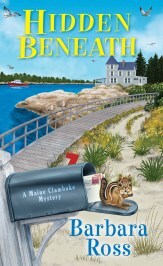
As soon as my next book goes in, you’ll find me on the back deck with a pitcher of iced tea and Hidden Beneath, the latest in Barbara Ross’s Maine Clambake series. It’s great to watch a young woman navigate business, family, and the push and pull of small town life. I can hardly wait to find out what trouble finds Julia Snowden next—and what on earth happens in her love life!
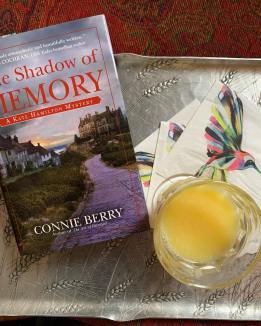
My favorite series are those where I learn something and feel I could actually be friends with the main character in real life, as with Connie Berry’s Kate Hamilton mysteries. I’ve never been to the U.K. I like vintage treasures and antique furniture, but I’m no expert. So traveling with Kate as she uses her curiosity and her expertise as an antiques dealer to solve the crime is doubly fun. Plus it’s a treat to follow a mature woman as she deals with common mid-life issues: forging a new path after widowhood, parenting young adult children, finding new love— but where to live and what to do about his disapproving mother?
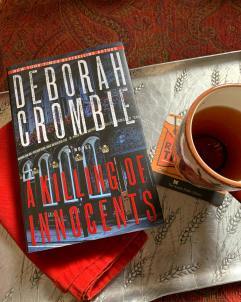
If I ever do get to England, I’d like to have a pint in a pub with Kate and Tom. Deborah Crombie manages to create dual protagonists, Duncan Kincaid and Gemma James, who are each equally appealing. Police officers who met in the line of duty and eventually become involved, they work together in some of the 19 books so far, but not all. We get to know their three kids, their friends, and their families along with their struggles and ambitions. In the latest, A Killing of Innocents, Duncan’s investigation into a series of murders forms the main plot, but when Gemma helps him out by going undercover, she realizes that her temporary part-time assignment is not satisfying, and that they have to find another way to manage career and family. I’ll be right there with them, watching as they figure it out—and keep on solving crime.

And I’ve got to mention the late Anne Perry’s Christmas novellas. Perry was incredibly prolific and I’ve only dipped a toe into her series, mainly the Thomas and Charlotte Pitt series set in Victorian England. In the novellas, a minor character from a series book takes a lead turn, often discovering a hidden strength or passion. My favorites are A Christmas Journey and A Christmas Secret.
So what about my own Spice Shop mysteries, set in Seattle’s Pike Place Market? I love giving readers a tour of the Market, a place I’ve loved since I was a college freshman, and a glimpse of other parts of the city. It’s deeply satisfying to spin a tale of crime and conflict and untangle it for the reader. But as much as I love the setting and plots, I’m in it for the characters—and I learn something new about them in each book. Between a Wok and a Dead Place takes us deep into Seattle’s Chinatown-International District, and I learned things about Pepper and her boyfriend Nate that I had not known. A minor character from an earlier book takes a major turn, another prepares to move on, and new staff join the shop. It’s a slice of life, spiced with mystery and history, and I hope it whets your appetite for a good read.
Readers, what draws you to a series? What are some of your favorites? One lucky reader will win a Spice Shop mystery of their choice.

Leslie Budewitz writes the Spice Shop mysteries, set in Seattle, and Food Lovers’ Village mysteries, set in NW Montana where she lives. As Alicia Beckman, she writes moody suspense, including Bitterroot Lake and Blind Faith. The seventh Spice Shop mystery, Between a Wok and a Dead Place, will be out July 18. Find out more and where to buy the book at http://www.LeslieBudewitz.com.
Join her on Facebook at www.Facebook.com/LeslieBudewitzAuthor or Instagram as www.Instagram.com/LeslieBudewitz , and find out what Leslie’s cooking and eating at www.MysteryLoversKitchen.com, where she posts on the 1st, 3d, and 5th Tuesdays.
July 13, 2023
The Trope of the Con
by Julie, sweltering in Somerville
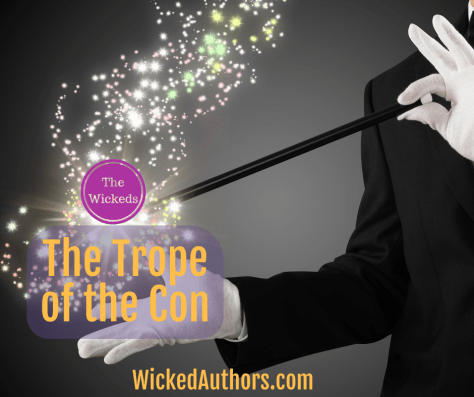
I host the Sisters in Crime Writers’ podcast, which gives me the opportunity to have great conversations with amazing writers about writing. Recently I interviewed Toni Kelner/Leigh Perry, and she mentioned The Big Con, a 1940 book by David W. Maurer about confidence men. She told me that the book helped the screenplay writers of The Sting, and that sold me. I love that movie.
I’m working on a book that centers on a con artist, but 2023 style. While nowadays technology can play a role, that isn’t what makes a con work. In fact, when I watched the Netflix documentary about Bernie Madoff, I was appalled and surprised at how low-tech the con was.
Con artists themselves have personality disorders that allow them to do terrible things without remorse. As a writer, these personalities are part of my toolbox for characters. Also, as a writer, I can observe those personalities with interest after I rid myself of outrage.
What interests me, as a writer, is the long con. How do you get someone to believe something and buy into it for a long time? How do you decide what the payoff is, or when to get out? Who do you trust to help you in your endeavor? Do you con them as well?
Why the con works feels easier to me. Con artists pray on our pain points, or secret desires. Greed aka getting rich quick is one of them, certainly. But there other pain points a con artist promises to mend. People want to feel as if they are smart enough to see something others aren’t. They want to feel included. They want to find an easier way to reach a goal.
Con artist research is interesting and disheartening. Empathy is necessary. We can judge the woman who fell for the romantic overtures of the handsome con artist, but should we? Wouldn’t promises of romance and partnership sway many of us? We can question why people fall for a Ponzi scheme, but if your friends told you it was a great deal, wouldn’t you believe them?
I’d make a lousy con artist. But hopefully I’ll be better at plotting one for a book. We shall see. In the meantime, what con books/movies/documentaries/podcasts do you recommend?
July 12, 2023
Wicked Wednesday: Worst Case Ideas
by Julie, summering away
Continuing on our theme of castaways, I’d like to discuss one of the ways a writer thinks. Whereas most people get upset thinking about a worst case scenario, we tend to take an ordinary event or circumstance and think of ways to make it bad. Then terrible. Then the worst.

Wickeds, do you daydream of making ordinary events terrible? Have you used these daydreams in a book? Does it get in the way of enjoying things?
Edith/Maddie: Of course I do! Whenever I’m out people watching, I always make up stories about strangers, their dark pasts, their terrible relationships. I dictate a lot of texts and emails and am fascinated by the autocorrect errors. That got me thinking about the errors’ potential for mayhem, so I’m noodling a short story based on some doozies. I’m happy to accept contributions in the comments.
Jessie: Dictation errors make me curious too, Edith! I am, at the bottom of all things, a strategic thinker. I am constantly calculating how a will bump into b and create c everywhere around me. I don’t necessarily seek to make things dark or terrible, but I do spot or speculate on connections and consequences. If those trajectories turn into something novel-worthy, so much the better!
Barb: I don’t think dark and terrible things about people I observe, unless they are being loud and obnoxious, in which case probably everyone else in the room is thinking the same thing. I give them back stories and current situations, but usually light, or comic, or unexpected ones. (Maybe that’s why I write cozies.) I do, however, daydream about apocalyptic events. I often look at the immediate horizon and imagine an explosion, a meteor, or a tidal wave, stuff like that. Then I think, “what do you do first?” That’s perfectly normal. Everybody does that, right? I think it’s a response to being momentarily bored and wanting a little novelty. I’ve never written a disaster or a post-apocalyptic piece of fiction, and I don’t think I ever will. (My son takes care of that department. You can read his short story Memory Day Report here.)
(Edith: Barb, that’s an amazing piece of writing!)
Sherry: Barb, I imagine those weird things too. But I give people dark sides when I see them. Recently, we were driving down this very busy divided highway. There was a man walking on this narrow strip of grass/weeds between the road and woods. He was carrying two heavy looking bright orange buckets with lids on them. I’ve never seen anyone walking there. It’s a very odd place to walk. Of course, my thoughts immediately went to the buckets have body parts in them. To make the whole thing every weirder I saw him again about five days later. This time with two white buckets! Serial killer.
(Barb: Sherry, I am laughing about bucket man!)
Julie: Sherry, bucket man is a writing prompt. Edith, I need to start dictating thoughts as they come, if for no other reason because of the autocorrects! Barb, I remember a dinner at Malice last year where you, Sherry and I were all silent, and realized we were wondering what was going on at the next table. The stories we came up with were great. I am definitely a worst case scenario gal.
I went to a ball game that was delayed because of a thunder storm, which meant we all had to go “inside” which meant the tunnels around Fenway. I turned to my brother-in-law and said that it looked like a setup for a scene in a Bruce Willis film, and there would be a motorcycle chase any minute. He looked at me, and nodded. Within two minutes we were all moving up to the area behind the grandstands.
A couple of weeks ago I had to call ServPro to help with some water damage. (Don’t ask.) Within minutes I had them talking about terrible clean up stories. Nothing too graphic, but the conversation was informative.
Liz: I am definitely a worst case scenario girl. I can go from zero to murder in ten seconds or less. And I love to look at idyllic places and imagine just how twisted things are just behind a few doors. I think it’s kind of fun! Of course I never want these things to really happen…
Friends, are you worst case imaginers? Does it get in your way of having fun, or do you use it to relieve stress?
July 11, 2023
Welcome Back Author Kate Flora and a #giveaway
by Barb, who handed in her book, then the sun came out and it’s a Maine summer!
Please welcome back to the blog Friend of the Wickeds, Kate Flora! All six of us have known Kate for a long time. She’s had some influence on every one of us, large and small. Kate’s here today in support of her twelfth Theo Kozak mystery, Teach Her a Lesson. The Thea books aren’t cozies, but I’ve assured Kate that many of our followers read more widely, particularly in the various crime fiction genres.

Take it away, Kate!
You’ll Need the Hide of an AlligatorBack when I used to teach writing, my favorite class was one I called, “I’ve Always Wanted to Write, But . . .” It was a class derived from my own experience and the experience of many others who dreamed of writing but who had somewhere along the way been discouraged by a writing teacher or a series of rejections and given up. It was a class in which I stuck bandages on their wounds and helped my students rediscover their love of writing and their individual voices.
We’ve all had the experience of someone saying, “I’ve always wanted to write a book and sometime when I have a free weekend I’m going to write one.” This overlooks the fact that writing is hard, sometimes brutally hard. There will be days when it will feel like you’re crawling over gravel or stripping off your skin. But real writers keep at it. We may take some time to huddle in a corner, licking our wounds, but we come out and crawl back to the keyboard and go on writing because we’re writers and this is what we do.
That hide of the alligator thing? I spent ten years in the unpublished writer’s corner, eight before I sold my first book, Chosen for Death, and two more years before it was published. Even when the writing was going well, sending out the manuscript time after time, only to get rejections or silence, was awful. Getting back my sample chapters with coffee stains and a penciled “no thanks” hurt. So did getting back a manuscript with a sticky note from one reader to another which said, “this is crap.” I evolved my own mantra to help me survive which I have since shared with my students: Only YOU get to decide that you are a writer.
Yes, we have to write the best books we can. Yes, with today’s dearth of editing it makes sense to hire a good private editor to make your book the best it can be. And yes, one of the best pieces of advice I can give an aspiring writer is to believe in yourself but expect to need the hide of an alligator to survive the publishing process. In the midst of all that, it is hard not to lose sight of the joy of writing. We have to cling to that, relish it, remain stubbornly optimistic in the face of all the discouragement.
I write this because at the end of May, Encircle Publications published a book I have worked on and believed in for more than twelve years, Teach Her a Lesson. I could probably fill a filing cabinet with all of the different iterations of this book. Different point of view characters have come and gone. Hundreds of pages have landed on the cutting room floor. I have used not one but two different editors. One to make it more of a fast-paced thriller. One to help me revise when editors didn’t find the central character appealing.
It would have been easier to simply give up, shove the book in a drawer, and move on. Sometimes I did. But I was really hooked on the story—one torn from the headlines—of a teacher wrongly accused of an affair with one of her students when it was the student who was the bad actor. He seemed so plausible, and some of her innocent actions made her look so guilty she almost doubted herself. She understood that nothing would satisfy him except to destroy her but no one would believe her.
Perhaps my more than a decade long struggle with this book demonstrates something other writers need to know: you have to believe in yourself and in your writing. No one is ever going to ring your doorbell and demand the right to publish your book. The work has to come from you. But never let them convince you that you aren’t a writer, because that also has to come from you.
Write on!
Readers: Is it plausible that a sixteen-year-old could be evil and manipulative enough to want to destroy his teacher?
About Teach Her a LessonWhat do you do when you’re accused of an unspeakable crime and know you’re innocent, but the evidence against you is so compelling? After six years as a high school English teacher, Alexis Jordan thinks her biggest problems are a case of burnout and her suspicion that her husband is having an affair.
Then things take a sudden, unexpected turn that threatens to end her marriage, wreck her career, and destroy her life when the student she’s coaching for the school play makes a pass at her and she turns him down. Alexis doesn’t realize that he is obsessed with her and has been building toward this moment for months. Nor that when he’s rejected, he will set out to destroy her with his version of their “affair”—which is terrifyingly plausible.
About Kate Flora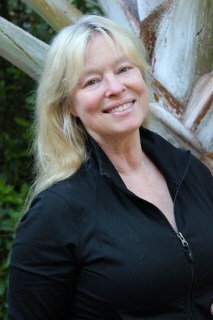
Kate Flora’s twenty-six books include crime fiction, true crime, short stories, memoir, and nonfiction. A finalist for the Edgar, Agatha, Anthony, and Derringer awards, she won the Public Safety Writers Association award for nonfiction and the Maine Literary Award for crime fiction. She’s a founder of the New England Crime Bake and the Maine Crime Wave. She blogs with the Maine Crime Writers. www.kateclarkflora.com
July 10, 2023
Politics in Cozies
by Barb, heading out tomorrow for a few days of vacation with my oldest granddaughter
Hidden Beneath, my eleventh Maine Clambake Mystery, was published on June 27. Since then, it has received some wonderful reviews in publications, on blog posts, and on review sites like Goodreads and Amazon. Many people have written to say they loved the book.
I also received this email:
Barbara, I pre-ordered Hidden Beneath and was enjoying every bit until I came to page 50 and the wokeness sentence appeared out of no where. I am disappointed that you felt it necessary to interject your political views. It cast a wet blanket over the story for me who is fed up with efforts to make it wrong to be “rich” and a sin to be white. I am amazed, as successful as you are, that you would deviate from your winning formula.
To be clear, the writer of the email signed her full name, town and state. She did not attempt to be anonymous. I removed that information.
Now, before everyone loses their minds, let me say a couple of things. 1) I agree that cozies should not be polemics about partisan politics. I know from my fan mail, which comes more often than you might think from chemo therapy chairs and hospital bedsides, many people turn to cozies in times of stress. “You were my pandemic read,” so many people have said to me. Since partisan politics create so much of our human stress, people often aren’t looking for that when they want to be entertained and taken away from their cares. And, 2) I don’t think an authorial voice advocating political positions belongs in cozies. I know other very successful authors approach the work differently and they should do what they do. Avoiding politics is not a part of the Cozy Covenant. It’s just that as a reader, I find these messages intrusive. More often than not they take me out of the story.
I do, however, believe that cozy characters, if they are well-rounded, do have political beliefs, and that occasionally they express them or otherwise make them obvious.
I’m going to write now about the political beliefs of my Maine Clambake regulars. If you think it’s going to make you crazy, this is your chance to bail.
Let’s look at the passage my correspondent reacted to. Julia and her ex-boyfriend Chris are on Chipmunk Island, a summer community of one hundred homes.
Back outside, there was a loud crack, and the crowd in the stands at the ball field cheered as a spry woman raced around the bases while a young guy chased a ball. In the golf cart, I sat back against the seat, taking it all in. Aside from the clothes they wore, the people on the green might have been playing baseball or tennis in 1890. I said as much to Chris. “It’s like the olden days here.”
He looked around and nodded his head. “Yup. Everybody’s rich and everybody’s white.”
Notice that the author doesn’t say this. It’s Julia’s ex-boyfriend Chris who says it. Chris is portrayed throughout the series as raised among great-uncles, who worked in Maine’s paper mills. He’s got an old-fashioned trade unionist point of view. Julia’s sister, Livvie, teases Julia in more than one book about her boyfriend being a “commie.” What Chris says is entirely consistent with his established character.
The quote above may not be what my correspondent objected to. Following what Chris says, Julia thinks, but does not say.
So maybe not the good old days after all.
Note that neither Chris or Julia say it’s bad to be rich or white. (Though Chris may believe it’s bad to be rich. Julia, a confirmed capitalist and entrepreneur, definitely doesn’t believe that.) Rather, Chris is expressing an observation about the community as it continues today and the forces of history that made it so. Julia knows that there may well have been written restrictions in the island’s charter about who could build or buy there. Or, the restrictions may not have been written down, just a practice of approving sales to “people we know,” in a world where that invariably meant, “people like us.” Though the world where written restrictions based on religion or race is gone, the fact that the Chipmunk Island houses never go on the open market informally perpetuates it.
Julia acknowledges this history in response to Chris’s remark. The good old days evoked by the island baseball game weren’t good for everyone. Note that neither one of them condemn the people who live on the island now, just the forces that caused it to be the place that is.
The whole of Hidden Beneath is a meditation on what’s worth keeping and leaving behind from the past. Julia is processing in the scene above. She keeps processing throughout the book as she witnesses things that are good and should be preserved, things that are bad and should be left behind, and things that societal change has rendered obsolete and that will be left behind no matter how we feel about them.
Chris and Julia also have different views of what “rich” means. Julia has worked in venture capital in New York City, so she has known some super rich people. Her friend Quentin Tupper (more on him later) also falls into this category. She thinks of the residents of Chipmunk Island as “comfortable.” There are no helicopters or super-yachts bringing residents to huge mansions. For Chris, the houses on the island, passed down from one generation to the next, represent inter-generational wealth. That makes the residents rich in his view of the world.
At the time this conversation takes place, Julia is living in the renovated mansion her mother inherited, so her view of inter-generational wealth is more nuanced. As she says, she doesn’t feel rich, but she does feel lucky. The series has never shied away from looking at differences in class and experience and how they affect the characters’ perceptions.
What about Julia’s politics? She went to college in western Massachusetts. (To Smith, though I never actually say that.) And then to grad school and work in New York City. She’s a classic northeastern liberal, though politics are not a main (or a Maine) preoccupation for her. The Maine Clambake Mysteries are written in the first person, so everything we see and hear is from Julia’s point of view. (Cue my theory that all narrators are unreliable–which drives Sherry crazy.) Is Julia me? No. She’s half my age for one thing, so she’s sensitive to things I am not. I, on the other hand, have a lot more lived history to inform my views than she does.
What about the other Maine Clambake Mystery regulars? Here’s what they believe politically. But remember, most of this is “off the page,” as we say about sex and gore in cozies. It informs my writing of the characters, but for the most part, you haven’t seen it explicitly.
Sonny, Julia’s brother-in-law, is conservative in his political views and in life. He believes in the old ways. He lobsters like his father did, and works at his wife parents’ clambake. Though he’s the antagonist in about three-quarters of the first book in the series, Sonny and Julia come to have a good working and family relationship based on mutual respect. In Muddled Through, Julia says of Sonny:He’d been a part of my life for more than half of it. We worked together every day all summer long. But we accomplished this by carefully avoiding landmine topics, including the biggies—religion and politics—and the small: for example, what was the best route out of the harbor in the small boat we used to move lobsters and ourselves out to Morrow Island for the clambake.
Surely everyone has a relationship like this.
Julia’s sister, Livvie, appears to agree with her husband politically, thought she rarely expresses her thoughts because her main interest is in keeping the peace between her husband and sister. Julia believes Livvie sometimes secretly agrees with her but there is no evidence for this. It’s just something Julia wants to believe about her sister.Neighbors Fee and Vee Snugg are Republicans whose ideal is legendary Maine Senator Margaret Chase Smith. Their loyalties moved to Senator Olympia Snowe and then to Senator Susan Collins. In the last several years, Vee has been having doubts about Collins. Fee has remained stalwart. They have never discussed it, but each quietly believes that she canceled out the other’s vote in the 2020 Maine senatorial election.Jacqueline, Julia’s mother also doesn’t discuss politics, not in the interests of keeping the peace, but because she was raised that it isn’t polite to discuss such things in (potentially) mixed company. When she is able, she has been quietly been giving money to Planned Parenthood for decades.Restaurant owner Gus is so conservative he advocates a return to the gold standard. His practice of only allowing people he knows and people who come with people he knows to eat in his restaurant is charming and well-understood by the locals but undoubtedly results in some instances of illegal discrimination.Mrs. Gus mostly agrees with her husband though she’s been known to roll her eyes or give him a sharp elbow when he really goes off.Quentin Tupper, silent investor in Julia’s family business, made a fortune in tech. He tends toward the libertarian outlook some of those tech guys have. Julia teases him about this, but he’s been so supportive of her and her family in so many different ways, neither of them lets politics get in the way of their relationship.LeRoy the cat is also a libertarian, as all cats are.I could have written Julia’s, or any of the characters’, politics as differing from what you’d expect from their background. That might have been more interesting character-wise. But it also would have required me to create opportunities to “show not tell” this, which would have required more dialog about partisan politics, which would have been the opposite of what I was trying to achieve.
In many ways I’m surprised I got the email above in response Hidden Beneath and not last year’s book, Muddled Through, which is much more “political.” The entire sixth chapter of that book is devoted to a contentious town meeting. There’s also an explicit discussion on the impact of increasing income inequality on resort towns like Busman’s Harbor. But that discussion does work with the Cozy Covenant, the last principle of which is “I want the book to be about something.’
Readers: Let’er rip. Does developing well-rounded characters require them to have political views? And, if so, how and how much do you want to hear about them?
July 7, 2023
A Wicked Welcome to Michele Dorsey!
by Julie, summering in Somerville
I am thrilled to welcome Michele Dorsey back to the blog to talk about a her new book, Gone But Not Forgotten.
A ROSE IS A ROSE, ISN’T IT?“What’s in a name? That which we call a rose by any other name would smell as sweet.”

When I began writing Gone But Not Forgotten (Severn House July 2023), I had no idea what category the story of Olivia Rose Taylor would fit in. I only knew I was writing the story of a 29-year-old woman who did not know the identity of her family of origin. Olivia’s mother fled to Vermont when Olivia was four and changed their identities when her husband threatened to kill them. But Olivia yearns to start a family of her own with her husband, who is a psychiatric resident, and reluctant to have babies without knowing Olivia’s gene pool. Olivia’s mother’s dementia and untimely death challenge her to find answers to who she is on her own.
What a mess. What was I writing? This was supposed to be a mystery. I only knew that Olivia story steeped deep within me. I found Olivia confronting psychological obstacles and barriers I wasn’t entirely familiar with and began researching something called “ambiguous loss,” which is essentially unresolved grief. Ambiguous loss falls into two basic categories. The first is when a person is physically present but psychologically absent. Olivia’s experience dealing with her mother’s dementia is a good example. The second category is when someone is psychologically present but physically absent. Olivia has grown up feeling the silent domination of her father’s influence in his absence without even knowing his name. When Olivia talks to her mother, it’s as if she’s talking to a stranger living in her mother’s body.
Her husband was adopted, so he too suffers the ambiguous loss of his birth parents and because his adoptive parents have died, he gets hit on both ends. Ambiguous loss is real psychological soup to stew characters in. The bottom line is a person sits across the table from someone who stares back but isn’t there, or sits alone at a table looking at an empty chair but feels the presence of a person missing.
The next psychological element Olivia faced was gaslighting, which is a term taking from a 1944 movie of the same name starring Ingrid Bergman. Gaslighting is a masterful and devastating form of manipulation used by a more powerful person to control another by twisting events and results in emotional damage in the recipient such as self-doubt. “That never happened,” and “I’m not the one who did that. You did,” are examples of the undermining that comes with gaslighting. Olivia encounters gaslighting in her relationship with her husband, leading her to feel unworthy and plainly pathetic.
All very interesting, but what was I writing? Although there is no blatant violence, the story takes place in Boston with scenes in hospitals, courts, restaurants, that are not consistent with cozies. I decided I must be writing a psychological thriller since there was so much psychology to the story. Because Olivia’s quest is to find her family so she can create her own family, it became clear Gone But Not Forgotten is a domestic thriller. According to the Crime by the Book blog, the term “domestic thriller” is one which every single reader might define just a bit differently – but at its most basic, this subgenre of crime fiction is a style of psychological thriller that focuses on interpersonal relationships.”
Does it matter in the end how you categorize a book? Writers know it can drastically affect marketing and sales. But my question is to readers. Does a label stop you from reading a book? Because a rose is just an Olivia Rose… which happens to be the name of the David Austen rose in my garden.
About the Author
C. MICHELE DORSEY, three-time finalist in St. Martin’s Minotaur Books/Malice Domestic Competition, is a lawyer, mediator and adjunct law professor. When she’s not visiting St. John, her favorite island in the Caribbean, she lives in Massachusetts with her family. Michele is also the author of the acclaimed Sabrina Salter series set on St. John in the Caribbean. SALT WATER WOUNDS was the latest addition to the series, which began with NO VIRGIN ISLAND and was followed by PERMANENT SUNSET and TROPICAL DEPRESSION She also writes the Danny and Nora O’Brien series. starting with OH DANNY GIRL, a legal thriller featuring Danny O’Brien, a young female lawyer whose newly widowed mother joins the firm just as Danny’s husband is found murdered, naked, with another woman in a hotel.
About the BookAn elderly mother with dementia – and dark secrets.
A daughter who’s desperate to know the truth – no matter what.
Get hooked by this thrilling, slow-burn novel of domestic suspense from critically acclaimed mystery author C Michele Dorsey.
Ever since Olivia and her mother fled their home, back when she was just a child, Olivia’s lived with her mother’s secrets and mantras. Don’t stand out. Don’t make friends. And most important of all: Don’t ask questions.
Olivia is now a twenty-nine-year-old law student. She lives in Boston in a beautiful home with the perfect husband. It’s a good life. But she’s always longed to know more about her family history, and now her beloved mother has dementia, she knows she probably never will.
That is, until her mother signs a check in a different name, the day before she dies, leaving Olivia an unexpected clue to her past – a clue that will lead her down a dark and deadly path.
Because someone doesn’t want Olivia to know her real identity. Her husband, her mother’s caregivers, even her best friend – can she trust they’re who they say they are? The truth about Olivia’s past may set her free – but only if she doesn’t die first . . .
July 6, 2023
Since You Asked and a Giveaway
There is some news that is so exciting to share and some you don’t want to at all. This is one of those posts I wish I didn’t have to write, but I’ve had lots of readers reaching out.
I’m sorry to say that Kensington didn’t renew my contract to write more Chloe Jackson Sea Glass Saloon mysteries. I feel so lucky to have been able to write four of them! Since I wasn’t sure what would happen when I turned in the fourth book, I tried to make sure Chloe’s life was in an upward trajectory!
What’s ahead may have some spoiler alerts if you haven’t read the series, but I wanted to let you know where I think the characters are, now, in this moment.
Chloe is so happy with Rip and yes, I’m sure an engagement is in the future. She is still getting into shenanigans with Ann Williams. There’s a certain someone she is hoping will return and face what must be faced. Chloe and Vivi are the most supportive of friends and love each other dearly. Chloe is taking over more and more responsibilities at the Sea Glass Saloon.
Vivi is engaged to Wade Thomas! They are taking time off to travel and enjoy each other.
Joaquín has a complication in his life. He’s been asked to be a judge of a dancing show filming in Los Angeles. The pay is amazing and would set him and Michael up for a good long time. But he hasn’t told Michael or Chloe about the offer yet!
Ann Williams is still fixing things for people, but can she fix things with Deputy Biffle? They are still circling each other and I’m hoping they will find a way to be together.
The rest of the good people of Emerald Cove are working hard and playing hard. They are all happy that the murder rate is down!
Thanks to all of you who have read these books and loved them. I’ve so enjoyed hearing from so many of you! I loved writing them and wished I had better news.
Readers: I don’t want to leave things on a sad note, so I’ll give away a set of the Sea Glass Saloon mysteries to someone who leaves a comment!
July 5, 2023
Wicked Wednesday: Ideas Adrift
by Julie, basking in the post holiday glow
This month the theme of our Wicked Wednesdays is castaways. Castaways are defined as a shipwrecked person, anything cast away or thrown away, or an outcast. We’ll have a good time with this theme.

Wickeds, today we’re going to talk about ideas that go adrift. Have you either started a novel or started plotting one, and the idea goes adrift and you have to chase it? What do you do? Do you try and corral it back, or do you follow the idea?
Edith/Maddie: What a great topic for the month! I definitely have had novels meander away from where I thought they were headed. It’s not that I chase them, exactly, but I do follow as far as I can. Sometimes I have to tell the character, “No. We’re not doing that,” (for example, in one of the Quaker Midwife books, I refused to let twin newborns both die). But other times I’m delighted by the new direction and commit to it.
Barb: The most common thing that happens is that either as I’m writing or when I’m revising, I start seeing all sorts of connections that I hadn’t seen in the first place. They may be related to characters, motives, themes, etc. I do pursue those hard. In general I’m not a person who lets “things get away from me,” so I’m really unlikely to let that happen in a world created entirely by me in my head. That’s the joy of being in a world where everyone has to listen to you and do what you think they should. You’ll never get that satisfaction in real life.
Jessie: Such an interesting question, Julie! I strive to work in discrete task chunks and to have a lot of clarity around which part of the job I am undertaking at any given moment. I give myself a lot of time early on in the process to let my mind wander and to make unexpected connections. I love to follow where the research or my imagination leads at that point. That said, once I have created a story map for myself of my novel I generally follow it closely as far as actions and motivations go. I never know the details like dialogue or description, but I am fairly set on what comes next by the time I am writing a draft.
Julie: Like Jessie, I typically chase ideas while in my plotting phase and I’m letting my mind wander. And usually those ideas are solid. But not always. Recently, ideas have cast themselves adrift and I’ve tried to ignore it until I realized that following that idea would have been a better story. These are both new books, not part of a series, so the characters are establishing themselves in the story. And my characters don’t always behave.
Readers, does your mind ever wander and come up with great ideas for you to follow? Or does a task ever cast itself off, and lead you in a new direction?
July 4, 2023
Have a Wicked Happy 4th of July
by Julie, dealing with rain and heat in Somerville, but still loving the 4th
My two favorite holidays have always been the 4th of July and Thanksgiving. They are about food, friends/family and fun. As I’ve gotten older, both days have taken on a bit of a more somber tone. The meaning of the holidays require some thought. I miss people who aren’t here any more to celebrate with me. Sometimes it takes a bit more effort to embrace the fun. Nevertheless, I persist.
To those who celebrate, have a wicked wonderful 4th of July. To those who don’t, do something fun today.

July 3, 2023
Wicked Welcome to Lori Roberts Herbst!
by Julie, prepping for the 4th in Somerville
I am delighted to welcome Lori Roberts Herbst to the blog today. Lori serves on the Sisters in Crime board, and I’ve really enjoyed getting to know her this past year. She’s also a wonderful writer, and I can’t wait for you to learn more about her protagonist, Callie Cassidy.
Truth is, I don’t find perfect people too interesting—though to be fair, I’ve never known any.
Nor do I care for the righteous, holier-than-thou types.
And don’t bother me with a syrupy sweet goody goody who can do no wrong.
I like ‘em flawed and funny and smart. And apparently, so do most of us.
Authors, and especially series writers, understand the importance of a “likable” protagonist. If readers are going to continue to follow a character through a number of books, they have to feel an affinity for the person and a desire to spend time with her. But what exactly defines “likability”? For me, at least, it’s not what you might think…

Here are a few examples. One of my all-time favorite TV characters is Dr. Gregory House, played brilliantly by Hugh Laurie. The character’s arrogance is boundless, as is his self-absorption. He verbally bludgeons employees and rarely exhibits kindness or compassion. At first glance—and even under deeper scrutiny—the man appears to be the antithesis of likability.
But we do grow to like him. We admire his intelligence, his skill, his abilities, and the fact that he uses those talents for good instead of evil. We enjoy his acerbic wit. And though he doesn’t display it in an obvious way, House is loyal to people he cares about. A brief scene every so often convinces us that beating within that tortured soul is a good heart, and we stick with him in anticipation of its continuing emergence. (Side note: Did you know House is the medical mirror image of Sherlock Holmes? Until recently, I didn’t, but in hindsight, it’s obvious. House/Holmes. Wilson/Watson. Keen powers of deduction. Drug addiction. Residence at 221B Baker Street. Face palm. How did I miss these connections?)
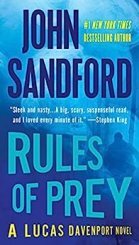
I’ve also fallen in love with Lucas Davenport, the protagonist of John Sandford’s Prey series. Though Lucas softens emotionally as the series progresses, he is a fundamentally aggressive vigilante cop who believes the end is more important than the means. But the “end” always occurs in the service of justice, so readers can support him when he takes the law into his own hands. Plus, the man is witty and charming. What’s not to love?
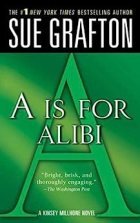
Same with Sue Grafton’s private eye Kinsey Millhone. We admire her intelligence, her cleverness, her loyalty—and her quirks. She is far from perfect, far from sweet, and a bit damaged by her past. But she strives for insight, and she journeys toward what is right, good, and fair.
When I consider the real world, it’s much the same. The people I’m drawn to exhibit depth, eccentricity, and passion. Though I would cringe if they went around killing criminals in the name of justice, I can sense that potential in many of them (you know who you are). I like them not because they’re perfect, but because they’re always trying to be better. And they have a sense of humor. For me, that’s critical.
Following my analysis of likability, I re-examined the protagonist of my own Callie Cassidy Mysteries. I’m pleased to say, I believe she fits the bill. I find her tenacious, humorous, flawed, and interesting. She has made—and continues to make—mistakes, but she owns them and strives for personal growth. She is a cynical optimist, an outgoing introvert, a hard worker, a fun person. Her friends and family rally around her and genuinely like her. As do I.
And I hope readers like her, too.
How do you define likability in characters? Who are some of your favorites?
Readers, the first book in the series, SUITABLE FOR FRAMING, is an Amazon 99 cent daily deal Monday, July 3!ABOUT THE BOOK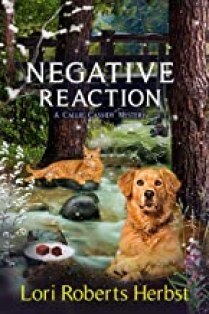
Wedding bells are ringing in Rock Creek Village. But when a venomous villager crashes the nuptials, events take a toxic turn…
The long-awaited day has arrived—Callie Cassidy’s best friend is tying the knot. The wedding is perfect—even Callie’s golden retriever and her tabby cat have donned tuxes for the occasion. Callie’s trainee is documenting every moment, with the help of twin brother. Then an uninvited visitor barges in—the twins’ absentee father—and an angry altercation ensues. When their father later winds up in a coma, the victim of poisoning, suspicion mounts against the twins. With detectives stonewalling her, Callie turns for help to her family and friends. Together, can they prove the twins’ innocence—and reveal the true culprit?
Buy link: Amazon
ABOUT THE AUTHOR
Silver Falchion and CIBA Murder & Mayhem award-winning author Lori Roberts Herbst writes the Callie Cassidy Mystery series. A former journalism teacher, Lori serves as Board Secretary for Sisters in Crime. She is a member of Mystery Writers of America, as well as the SinC North Dallas chapter and the Guppy chapter, where she moderates the Cozy Gup group. Lori lives in Dallas, Texas. Find out more at
Website: www.lorirobertsherbst.com
Facebook: https://www.facebook.com/lorirobertsherbst/
Instagram: https://www.instagram.com/lorirobertsherbst/
BookBub: https://www.bookbub.com/profile/lori-roberts-herbst



